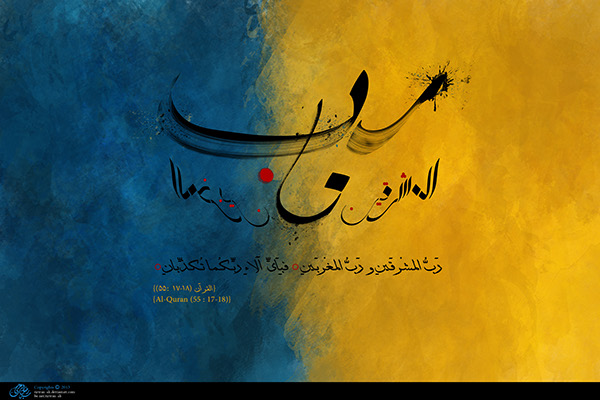Sūrat ar-Raḥmān (Arabic: سورة الرحمان, “The Most Merciful”) is the 55th sura of the Qur’an with 78 ayats.
It has the refrain: “Then which of your Lord’s blessings would you both deny?”
The title of the surah Rahmaan, which appears in verse 1, means “The Most Beneficent”. The divine appellation “ar-Rahman” also appears in the opening formula which precedes every sura except Sura 9 (“In the Name of God, the Lord of Mercy, the Giver of Mercy”). English translations of the sura’s title include “The All Merciful”,[1] “The Lord of Mercy”,[2] “The Beneficent”, and “The Mercy-Giving”.
Scholars have disagreed about whether Al-Rahman ought to be categorized with suras of the Makkah or Madinah period. Theodor Nöldeke and Carl Ernst have categorized it among the suras of the early Makkah period (in accordance with its short ayah length), but Abdel Haleem has categorized it in his translation as Madinian .[3] According to the traditional Egyptian chronology, Al-Rahman was the 97th sura revealed.[4] Nöldeke places it earlier, at 43,[5] while Ernst suggests that Sura 55 was the fifth sura revealed.[6]
Al-Rahman is composed entirely in saj’, the rhymed, accent-based prose characteristic of early Arabic poetry.[7] Owing, perhaps, to the sura’s poetic beauty, it is often regarded as the ‘beauty of the Quran’, in accordance with a hadith: Abdullah ibn Mas’ud reported that Muhammad (s.a.w.) said, “Everything has an adornment, and the adornment of the Qur’an is Surah ar Rahman” [Bayhaqi in Shuab al Eiman].
The most notable structural feature of Al-Rahman is the refrain “Which, then, of your Lord’s blessings do you both deny?”[8] (or, in Arberry’s rendering, “O which of your Lord’s bounties will you and you deny?”[9]), which is repeated 31 times in the 78-ayah sura. The sura is composed of 26 couplets, 4 tercets, and an introductory stanza of 13 ayahs all ending with this refrain. The final couplet is followed by a blessing of Allah’s name.
Thematically, Al-Rahman can be divided into roughly three units. Verses 1-30 expound upon natural displays of Allah’s creative power and mercy in showering those who inhabit the earth with blessings. Verses 31-45 describe the final judgment and the terrible punishment that will be inflicted upon sinners. Verses 46-78, by contrast, detail the delights that await the pious in paradise
One of the main aims of the sura is to chastise men and jinn for their lack of gratitude towards Allah, who has showered them with an abundance of blessings. Verses 1-30 describe some of the resources (fruits, palm trees, husked grain, fragrant plants, fresh and salt water, pearls, ships) that Allah has graciously provided for the men and jinn he created, in his infinite mercy, out of clay and smokeless fire (55:14), and set down under a sky illuminated by the twin risings of the sun and moon (55:17). In addition to these material blessings, verses 1-4 recount the fact that Allah taught man how to communicate and even gave him the Qur’an to guide him on the path to righteousness. The refrain, “Which, then, of your Lord’s blessings do you both deny?”, chastises the bountifully-provided for men and jinn for failing to acknowledge their indebtedness to Allah for his tremendous mercy. The punishment that awaits these ungrateful creatures is briefly described in verses 35-45; for the remainder of the sura, the delights of the gardens of paradise (replete with shading branches, flowing springs, fruit, maidens, couches, cushions, and fine carpets) are lyrically described, punctuated throughout by the stinging refrain which draws attention to the discrepancy between Allah’s mercy in providing such luxuriant rewards and the ingratitude of men and jinn.














